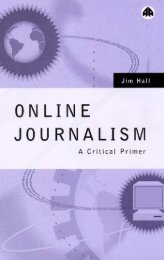Modul Mata Kuliah Journalisme Online - Ayo Menulis FISIP UAJY
Modul Mata Kuliah Journalisme Online - Ayo Menulis FISIP UAJY
Modul Mata Kuliah Journalisme Online - Ayo Menulis FISIP UAJY
Create successful ePaper yourself
Turn your PDF publications into a flip-book with our unique Google optimized e-Paper software.
Find facts, not just others' opinions, to support your comments. Start with sites such as our guide to<br />
reporting to learn how to find real data, not someone else's spin. Make sure that what you are writing<br />
isn't merely repeating some urban myth, either.<br />
If you are writing about someone else, call or e-mail them for a comment before you publish. If your<br />
subject has a blog, link to it. That link will notify the subject that you've written about them, and will<br />
allow your readers to click-through and read the subject's side of the story.<br />
If you want to write satire or spoofs, fine. But make sure your audience knows that what you are writing<br />
is not literal truth. Tricking readers won't help you develop the respect, credibility or loyal audience that<br />
truthful writers enjoy and rely upon.<br />
Be honest<br />
In summary, be honest with your readers and transparent about your work. If people wonder for a<br />
moment about your honesty or your motives, you've lost credibility with them. Don't let them do that.<br />
Answer those questions even before readers ask.<br />
And most important is to never utilise your power of press for personal gains or simply annoying<br />
someone.<br />
© <strong>Online</strong> Journalism Review<br />
http://wiki.media-culture.org.au/index.php/<strong>Online</strong>_Journalism_-_Ethics<br />
Is there a limit to what blogs should and should not publish?<br />
The line between what constitutes blogging and journalism is blurred and so too is the line that decides<br />
the degree to which normal journalistic ethics apply to bloggers(Colin, 2004).<br />
Wonkette and Drudge (in Colin, 2004) argue that there is a limit to what should be published by bloggers<br />
and the that the lead can be taken from the written press. For example, if a newspaper does not print<br />
the name of someone then bloggers can safely do the same. Colin argues that there are practical<br />
considerations of legal liability that leave bloggers vulnerable. Newspapers have the advantage of capital<br />
and lawyers to defend themselves from libel law suits.<br />
Past cases show that bloggers have never been sued successfully sued for what they have printed. This is<br />
illustrated by the case study of Blumenthal vs Drudge. Drudge accused Blumenthal of being a wifebeater<br />
and online opinion found this unethical if not illegal. Drudgeâ€s blog had many influential<br />
readers and the rumor, no matter how outlandish, was potentially damaging (Colin, 2004). However,<br />
Blumenthal lost the case with the judge ruling that Drudge was not a journalist, reporter or news<br />
gatherer (MacDonald, 2001). Legal experts, while pleased that the outcome upheld the first amendment<br />
of free speech, remarked that this was not a good example of ethical online journalism. As evidenced by<br />
this case, the ethical implications for bloggers rely on whether or not blogging is considered a form of<br />
journalism.
















